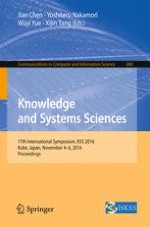2016 | OriginalPaper | Chapter
Effects of Different Trust on Team Creativity: Taking Knowledge Sharing as a Mediator
Authors : Jiangning Wu, Hang Zhao, Donghua Pan
Published in: Knowledge and Systems Sciences
Publisher: Springer Singapore
Activate our intelligent search to find suitable subject content or patents.
Select sections of text to find matching patents with Artificial Intelligence. powered by
Select sections of text to find additional relevant content using AI-assisted search. powered by
